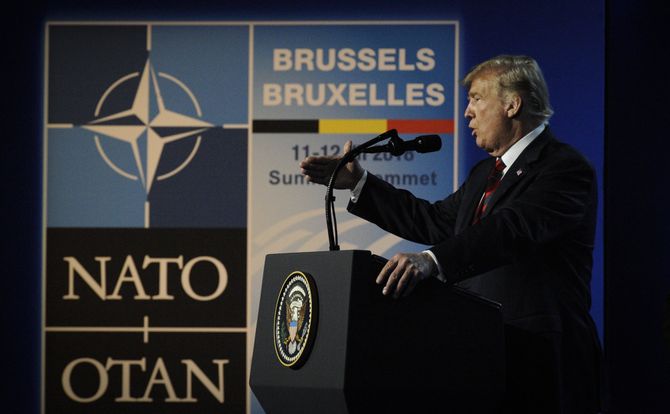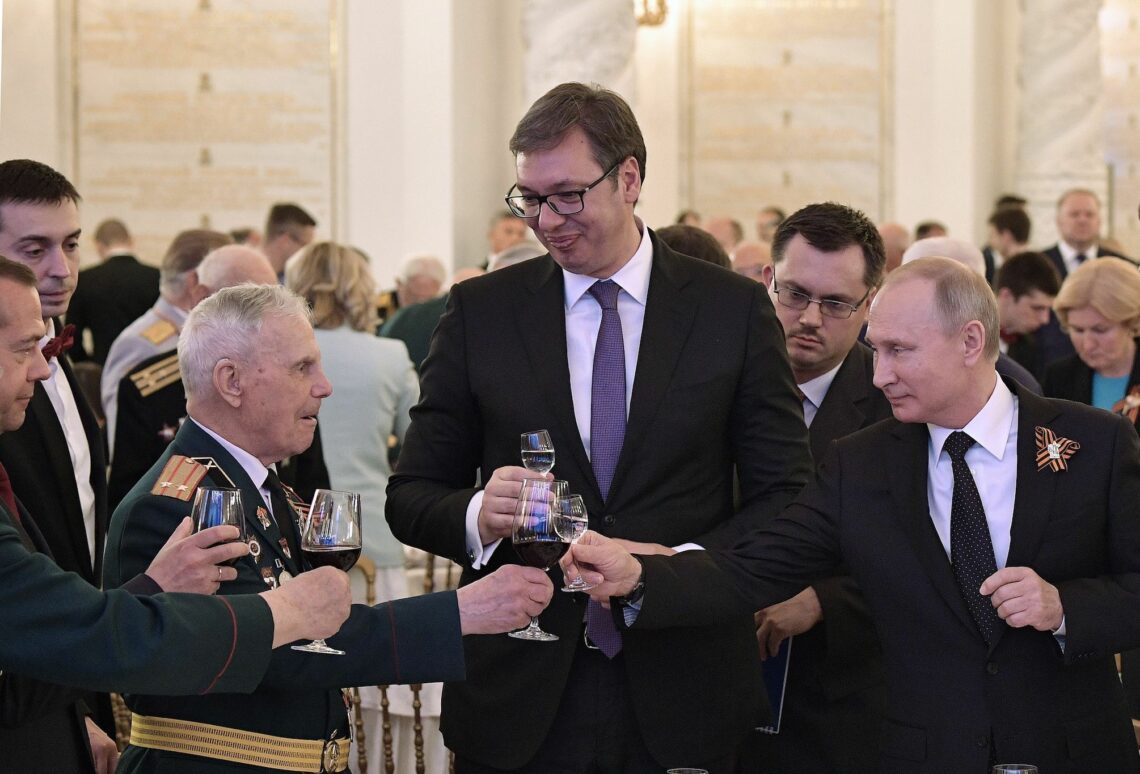Is the U.S. going back to the Western Balkans?
The U.S. is increasing its engagement with the Western Balkans to reduce instability in the region, improve economic development, and counter outside influence from countries like Russia and China. If these efforts are successful, U.S. capital investment will increase, and the Balkans will move closer toward NATO membership.

In a nutshell
- The U.S. is getting more engaged in the Western Balkans on security, energy and governance
- The policy aims to counter Russian attempts to destabilize the region and other outside influences
- The administration hopes to increase American investment and nudge states toward NATO membership
As a debate rages about whether the United States is disengaging from the transatlantic community, there are mounting signs that Washington is ramping up its efforts in the Western Balkans. U.S. officials believe that the region is the most fragile in Europe. It is vulnerable to the Kremlin’s destabilizing influence, both directly through the Russian military presence in the region and indirectly, by Moscow’s manipulation of local governments through corrupt practices
Other outside players like China, Turkey, Saudi Arabia, the United Arab Emirates and Qatar are also complicating regional politics, as is the ambivalent engagement of the European Union. Further, a lack of economic freedom and development hamper efforts to make the region more resilient. Increased American efforts to engage in the Balkans should make a positive contribution to stability.
Two factors weigh on the U.S. approach toward the Western Balkans. One is the tension between Washington and Moscow over destabilizing Russian activities in Western Europe. The other is the poor economic development and lack of regional integration that would support a north-south corridor as the backbone of European security and growth.
From Russia without love
The July 2018 Helsinki press conference between U.S. President Donald Trump and Russian President Vladimir Putin generated enormous confusion and controversy on both sides of the Atlantic. Following the tumultuous response, the U.S. administration took a rapid series of steps to reassure friends and allies in Europe. President Trump held constructive trade talks with the President of the European Commission Jean-Claude Juncker.
The U.S. Defense Department announced additional military assistance for Ukraine and the State Department issued a public nonrecognition statement on Crimea. The U.S. reaffirmed its commitment to sustaining sanctions against Russia, while Mr. Trump’s next meeting with President Putin was postponed until at least next year. These initiatives contrasted with the tone of the Trump-Putin summit in Helsinki.
The Western Balkans are vulnerable to the Kremlin’s destabilizing influence, from military ties to corruption.
What is noteworthy about the post-Helsinki actions is that they reflect a reaffirmation of administration policies, not a change. That reminds us to be cautious about interpreting American actions simply by cherry-picking comments and tweets by the president, who in public practices his own unconventional manner of statecraft that often does not express the totality of American policy.
This context is important for assessing policy toward the Balkans. The U.S. regards Russia’s destabilizing activities in Western Europe as a threat to American interests, a position affirmed in the latest National Security Strategy. Washington’s concerns were increased by Russian activities in the Western Balkans, which policymakers consider an especially fragile region.
Future of Europe
Heated transatlantic rhetoric aside, the U.S. continues to view NATO as the cornerstone of Western security. While administration policies on the EU are inconsistent, the White House is not out to deconstruct the European project. At the same time, the current U.S. strategy for Europe is based on the importance of bilateral relationships.
In this context, this administration has taken a keen interest in Europe’s north-south axis, for several reasons. The alignment of states running from the Norwegian Sea to the Mediterranean is on the front line between Russia and the West. These countries are important in mitigating Chinese influence in Europe and could serve as a corridor to enhance European energy security and economic growth.
A successful north-south axis makes for a stronger and more resilient Europe, and a better economic and security partner for the U.S. North-south integration is anchored in the lands between the Adriatic Sea and the Black Sea. In this respect, a prospering, well-governed and integrated Balkans is part of the U.S. vision for the future of Europe.
Security concerns
Without question, the top U.S. security worry in the Balkans is the political instability in Bosnia and Herzegovina. As Daniel Kochis, an analyst at the U.S.-based Heritage Foundation, recently noted, “Moscow knows that the easiest way to prevent Bosnia and Herzegovina from entering the transatlantic community is by exploiting internal ethnic and religious divisions between the Bosniak, Croat and Serb populations inside the country.”

Of particular concern is Republika Srpska, the troubled, heavily ethnic-Serb entity in Bosnia. The possibility that the area could declare independence remains a flash point. Serbia’s interactions with Republika Srpska (which often mirror Russian views) only exacerbate concern. Officially, the Serbian government does not support the entity’s independence, but there are frequent complaints in the region that the future of Bosnia is being “held hostage” by Serbia. The U.S. concern is that a Srpska declaration of independence or its merger with Serbia would trigger a regional war.
The second most closely-watched security issue for the U.S. is the ongoing negotiations between Kosovo and Serbia. Since Kosovo declared independence in 2008, Serbia has refused to recognize the country, and relations have remained tense. While a dialogue has opened between the two nations in recent years, mistrust is rampant on both sides.
For example, at the direction of Belgrade, the Serbian minority in the Kosovo parliament continues to block efforts to alter the Kosovo constitution to formally create its armed forces, which the government sees as a necessary precondition for applying for NATO membership. The Serbian government has been accused of lobbying against Kosovo’s participation in international organizations and of pressing states to not recognize its sovereignty. For its part, Serbia remains deeply wary of Albanian influence in Kosovo.
Economic and governance concerns
Perhaps even more concerning to the U.S. than security issues is the region’s lack of progress on regional development and integration. The main culprits are constraints on free enterprise, slow GDP growth and poor governance practices. Corruption is a particular challenge. As one official in the region noted, “the Balkans are close, relevant and cheap” — an attractive formula for corruption and corporate cronyism.
The hope of integrating the Western Balkan states into the EU as a ready solution for the region’s challenges has faded. Although the EU remains engaged at the bilateral level, its leadership has faltered and the chances of more states joining the bloc in the near term are low. The recent EU summit on the Western Balkans in London was a disappointment, with scant progress made (albeit in part because British leadership was distracted by Brexit issues). Europe also worries that without the structural and economic reforms to spur economic growth and create jobs, any further expansion into the Balkans would simply drain talent and capital to other parts of Europe.
The hope of integrating the Western Balkans into the EU as a solution to the region’s challenges has faded.
Another concern is the lack of energy independence and security. The region has little access to natural gas. It is dealing with controversy over coal and nuclear energy, faces challenges with funding hydroelectric projects, and has had disappointing results in developing renewables.
Security engagement
The U.S. reengagement in the Balkans is following two tracks. First, Washington continues to view integration into NATO as the long-term solution to regional security. At the NATO summit in Brussels, for example, the U.S. backed continued NATO engagement with Bosnia-Herzegovina. Recently, senior officials publicly endorsed the establishment of armed forces in Kosovo as another step toward the country joining NATO. The U.S. continues to actively support Macedonia’s membership in the alliance as well – though whether there is enough domestic support for its application remains to be seen.
The U.S. is also active in the region on a bilateral basis. Military activities include cooperation with Serbia, where the U.S. conducts more joint exercises than the Russians (albeit the latter have a far larger and permanent military and intelligence footprint).
Economic and governance engagement
The second American focus is on economic and governance issues, which are regarded as a way to make the region more productive and more resistant to outside meddling. The U.S. has been funding development in the Balkans since the wars of the 1990s. The United States Agency for International Development (USAID) has active programs in several countries, including Serbia, and the Millennium Challenge Corporation (MCC) recently expanded its cooperation with Kosovo.
In promoting good governance, the Trump administration has largely put an end to previous policies of imposing progressive social policies on the Western Balkans and unnecessarily interfering in the domestic politics of sovereign nation states. These efforts, in what are largely conservative societies, were more destabilizing than helpful.
The U.S. is supporting free market solutions on energy security, like a robust north-south energy corridor.
On the economic front, the U.S. is attempting to expand and better integrate its efforts. In part, this is in response to China’s growing influence through initiatives like the Belt and Road and the 16+1 Initiatives. Congress is currently considering legislation to better coordinate the development efforts of the State Department, USAID, MCC and the Overseas Private Investment Cooperation.
The U.S. also supports programs that would advance free market solutions for energy security, especially the development of a robust north-south energy corridor. It opposes Nord Stream II, the joint German-Russian project to build a second gas pipeline under the Baltic Sea. In contrast, Washington has been very supportive of the Three Seas Initiative and plans to send a senior official to attend the next summit in Romania. However, the U.S. has been less active and effective in attracting private American investment in the region.
Scenarios
The U.S. is likely to become more of a presence in the Western Balkans and to increase its cooperation there with the EU. After seeing how stronger American and European engagement in the Baltic states allayed concerns about that region’s vulnerability and fragility, the U.S. will probably try to replicate that formula in southeastern Europe.
In addition, expect the U.S. to accelerate bilateral engagement to ensure a sustained balance of interests and capabilities in the region. It will look to work more closely with countries that can help foster stability there, including Austria and Croatia.
Higher levels of engagement, economic liberalization and energy diversification may well attract more private investment from the U.S. and generate additional momentum toward NATO enlargement. In the end, these developments — perhaps even more than the promise of EU membership — should advance governance and economic reforms in the region.







